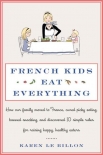French Kids Eat Everything by Karen Billon (interesting books to read for teens txt) 📗

- Author: Karen Billon
Book online «French Kids Eat Everything by Karen Billon (interesting books to read for teens txt) 📗». Author Karen Billon
I also griped, at first, at how inconvenient it seemed to shop at the marché. Buying enough for a family of four for a week meant lugging heavy paniers (the straw baskets also used in supermarkets, as plastic bags have been banned in French grocery stores). Because the stalls spilled out into lanes and streets, cars were banned from the center of the village until the market was over around noon (in order to allow everyone to go home for their two-hour lunch, bien sûr).
This meant a long walk back home. At first, I struggled with my overloaded paniers, huffing and puffing back up the hill to our house—feeling slightly embarrassed as gray-haired grandmothers briskly sailed past me with their wheeled caddies. But lugging the bags provided some exercise, which I desperately needed: French women rarely work out (schlepping groceries being enough of a workout, apparently), and there was no gym within twenty miles of the village. And Janine taught me to buy smaller amounts and shop more frequently, as the French do. I even broke down and bought a caddy with a gaily-colored Scottish plaid motif that seemed out of place until my father-in-law pointed out that Brittany had actually been settled by Celts fleeing the invasion of Britain by the Anglo-Saxon tribes. (This gave me new insight into the French dislike of the “Anglo-Saxons,” a category to which I apparently belonged, and into which Germans, British, Americans, Canadians, and even Australians are usually lumped.)
There was another advantage to buying food at the market. Food was fresher this way, Janine explained, because it could be purchased at precisely the right moment. This transformed what had been one of the most frustrating market rituals into one of my favorites: watching the fruit and vegetable vendors ask, “When do you want to eat it?” The customer’s response would identify not only the day, but also the meal at which the item was to be consumed. “Tomorrow for lunch!” Or “Dinner on Saturday!” The vendor would then conduct a painstaking search (customers never being allowed to touch the produce themselves) through the avocados (or melons, or tomatoes, or pineapples, or whatever it was) until the perfect one was found. The logic of the long lines slowly became more apparent. If this much care went into planning every meal and choosing every item, no wonder it all took so long.
But there was another reason people liked the long and multiple lines: they were a core part of the village’s social life. People didn’t enter into idle conversations at the local café (as I discovered after a few cold shoulders). There were no chairs for sitting down in any of the stores. The village was too small to have a library. In fact, there was almost no common space anywhere in the village apart from the central square in front of the church that was used as a parking lot when the market wasn’t being held.
Where, I wondered in the first weeks we were there, did people socialize? The market lines—which recomposed themselves rapidly as people moved from one stall to the next—provided, I discovered, one of the only opportunities for the normally reserved Bretons to banter and chat. If people were in a hurry, they’d come early (before the crowds) and be done in a few minutes. If they wanted to socialize, they’d come later.
By the end of the summer, I started coming later more and more often, as I learned so much from the conversations I struck up. These would often revolve around the food in front of us. How were the garlic shoots this week? What were the radishes like last week? Why were the local mackerel so small this season? Going to the market twice every week gradually introduced me to the local food culture. I had no idea that this variety of food could be available in one place. And I encountered lots of new tastes: huîtres (oysters, which I finally consented to eat, much to the approval of my father-in-law), moules (mussels, which soon became a favorite, cooked simply with white wine and a little parsley), and cidre (Brittany’s famous apple cider).
Gradually, I learned that asking about food was a great conversation starter. I found that the best way to initiate conversations was to innocently ask: How do you cook this vegetable? (Or, more often than I’d like to admit: What is that vegetable?) A chorus of voices would respond, offering recipes, debating cooking times, suggesting spices. The ice would be broken, and we would move on to other topics.
The local fisherman was one of my first allies. By the time the market was setting up at 8:30 in the morning, he had already been up for hours, as the in-shore fishing boats left and returned before sunrise. But he had endless energy and a soft spot for kids. “Furr zee baybee” he would say smilingly, carefully filleting the fresh fish in front of us.
Everyone in the line discreetly listened to my answers to his gently curious questions about life “en Amérique” (English Canadians are, whether they like it or not, lumped in with Americans when abroad). Knowing that September was just around the corner, I would ask him questions about the local school, which his children attended—and where Sophie would be going. With Sophie hanging on every word, he





Comments (0)